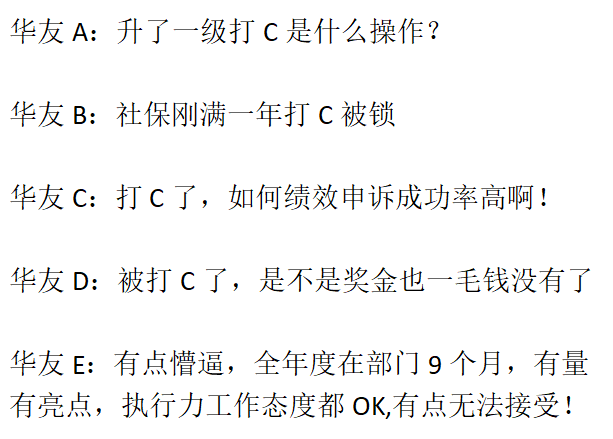
That night when I received Performance C, I hid in the tea room and smoked half a pack of cigarettes, staring blankly at the mortgage bill on my phone.

But brother, let’s hold back the tears for now!
Ren Zhengfei once said: “Huawei is not the only good company, if you don’t stay here, there will be other opportunities. In a couple of years, the company may correct itself, and you can come back then.”
This sounds like a rough man trying to mediate, but it actually contains a grand vision: Performance C is just a comma in life, not a period.
Ren Zhengfei has offered many constructive suggestions to young people in his speeches, which are both humane and common sense, as well as experience. We have compiled some of them, hoping to help young people.
1. Proactively seeking help is a shortcut to integrating into the team.
Ren Zhengfei said: “There is nothing disgraceful about seeking help; it is disgraceful to do a poor job.” Newcomers in the workplace should let go of their “face” and learn quickly by asking questions.
2. Practice is more important than academic qualifications.
Ren Zhengfei emphasized: “Companies determine income based on the contribution of knowledge, not academic qualifications.” Academic qualifications are just a stepping stone, but continuously producing value is the survival rule.
3. Self-criticism is a ladder to progress.
“Most people become petty after working, which is a stumbling block for the company.” One should examine oneself like “I reflect on myself three times a day” to avoid falling into closed-mindedness.
4. Vision determines pattern.
It is recommended that young people “read thousands of books and travel thousands of miles,” maintaining curiosity about the world like Ren Zhengfei. He once read 400 pages in two hours on a plane and could remember the key points.
5. Start with small tasks before pursuing big ones.
“Position yourself correctly; don’t be afraid to play a small role, as it may lead to a larger role.” Huawei’s internal promotion follows the principle that “a fierce general must emerge from the ranks of soldiers,” and success at the grassroots level is hard currency for promotion.
6. Compromise is wisdom, not surrender.
“To achieve goals, one can concede on secondary issues.” In the workplace, being hard-headed can lead to hitting a wall; wise compromise is to gain greater opportunities.
7. Trust from leaders is more important than “rectifying the workplace.”
“Respect your direct leader, even if you are more capable.” Without the opportunity of the first step, how can there be subsequent development? Power is in the hands of those who can create value for the team..
8. A sense of crisis is the driving force for progress.
“The times are advancing too quickly; staying stagnant for three months will lead to elimination.” Huawei can withstand sanctions precisely because it always maintains the vigilance of “winter is coming.”
9. Enduring grievances can lead to greatness.
“A bird that cannot be burned is a phoenix.” Greatness is nurtured by grievances; those without endurance cannot take on great responsibilities.
10. Reject ineffective socializing.
“In WeChat Moments, reduce posts about eating and playing, and interact more with knowledgeable people.” Where you spend your time determines the height of your life.
11. Humility is the badge of the strong.
“When society does not recognize you as a Huawei person, you are truly a Huawei person.” True experts focus on doing their work rather than flaunting their identity.
12. Learning ability is more important than intelligence.
Ren Zhengfei is disciplined to the point of “never playing cards or dancing at night.” He said: “Continuous learning is a compulsory course for every employee.” Only through continuous learning can one cope with uncertainty.
13. Embrace the times, rather than complain.
Ren Zhengfei’s message to young people: “Vision, will, character.” Those who care for the world can find the right direction in the tide of the times.
14. Treat the company platform as a springboard, not an endpoint.
“Huawei is not a retirement home; you need to accumulate capabilities on the platform.” Even if you leave, the label of a Huawei person should be “capable of fighting tough battles,” not “coasting through life.”
15. Don’t be trapped by short-term interests.
“Salary is given by the company; growth is your own.” Accumulate experience when you are young, rather than being overly concerned about salary increases.
16. Failure is a rehearsal for success.
“The company cannot always win, and individuals will also experience setbacks.” The key is to extract methodology from failure, rather than getting caught up in emotional exhaustion.
17. Health is more important than performance.
Ren Zhengfei once reminded employees: “Don’t put too much pressure on yourself; those who are psychologically unhealthy find it hard to succeed.” Balancing work and life is essential for going further.
18. Be a “warm-hearted” fighter.
The core of Huawei’s culture is “collective struggle,” which requires pursuing personal growth while also learning to collaborate with others. As Ren Zhengfei said: “A common value system is the bond that holds the team together.”
In summary, Ren Zhengfei’s advice lacks flowery language but strikes at the weaknesses of human nature. He is like a strict yet sincere mentor; understanding his thoughts at 20 can help avoid detours, and grasping them at 30 is still not too late. After all, there are no wasted paths in life; every step counts. Ren Zhengfei’s management philosophy is a profound insight and steadfast practice of the value of “every step.” It reminds us that true growth often stems from a clearer understanding of the world and stricter demands on oneself, along with continuous transcendence.